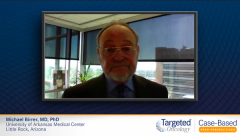
Treatment Armamentarium for Advanced Endometrial Cancer
A broad look at the systemic and targeted therapies available for patients diagnosed with advanced endometrial carcinoma.
Episodes in this series

Case: A 70-Year-Old Woman With Endometrial Cancer
Initial Presentation
- A 70-year-old postmenopausal woman presents after experiencing abnormal uterine bleeding for about 3 months. She has a grown daughter, underwent menopause at 52 years of age, and her father had prostate cancer in his late 60’s.
- PMH: Unremarkable
- PE: Notable for large uterus and tenderness upon palpation
Clinical work-up
- Endometrial biopsy: endometrioid adenocarcinoma, FIGO grade 1
- Surgery: ELAP TAH BSO with bilateral pelvic node dissection
- Pathology: grade 2 endometrioid adenocarcinoma, 15 negative pelvic nodes, invasive 1.9 cm of 2.4 cm myometrium
- Molecular testing shows MSI-high, MMR proficient, and HER2-
Treatment
- Postoperative radiotherapy: vaginal cuff brachytherapy to a dose of 21 Gy in 3 fractions
- 12 months after completing radiotherapy, she presented with new RLE edema and right hydroureter
- She then was treated with carboplatin/paclitaxel chemotherapy which was well tolerated
Treatment
- 15 months later the patient has disease relapse with metastases to the paraaortic lymph nodes
- She is now treated with pembrolizumab
Transcript:
Michael Birrer, MD, PhD: It’s all changed now because of our better understanding of the molecular biology of this tumor and new effective agents. Chemotherapy is still carboplatin-paclitaxel, and it’s standard of care. You’ll occasionally see a single-agent carboplatin in patients who are older and more fragile. Normally, it’s the combination and still very effective. With response rates, they’re very acceptable. It’s the combination that’s used in both adjuvant chemotherapy for high-risk tumors and recurrent tumors in the metastatic setting.
A subset of endometrial cancers are very well differentiated and hormonally driven like type 1 tumors that are ER [estrogen receptor] and PR [progesterone receptor] positive. They behave so well and indolent that hormonal agents are perfectly acceptable. Standard of care is Megace or tamoxifen. Some people even use a combination of those. You can use gonadotropin inhibitors, and you can also use aromatase-type agents. All of them give reasonable response rates in these well-behaved tumors. The new kids on the block are the immuno-oncology drugs. These drugs, in particular, are active and effective against tumors that have microsatellite instability. The mechanism behind that is the fact that when you have mismatch repair, you get shifts in the DNA and form proteins that have neoantigens. These neoantigens are proteins that the body has never seen. The immune system recognizes them, and the immuno-oncology drugs activate the T cells, which then fight the tumor. It’s a brilliant new approach for these tumors, and it’s quite effective.
There are other agents, like tyrosinase inhibitors. A lot of these endometrial cancers have PI3 kinase mutations or 10p deletions that activate the PI3 kinase pathway. If you go to mTOR, a protein way down on the end of that pathway, a number of mTOR inhibitors are on the market are moderately effective. Finally, we’ve known for a long time that antiangiogenic agents such as bevacizumab are active. Memorial Sloan Kettering [Cancer Center] had a phase 2 trial showing 15% to 20% response rates for bevacizumab, which was very well tolerated. Antiangiogenic agents are important. Lenvatinib, which is a somewhat dirty kinase inhibitor, certainly affects blood vessel formation for the tumors, but it probably does other things and synergizes in a very effective way with pembrolizumab. That’s my summary of the major agents for endometrial cancer.
Transcript edited for clarity.








































